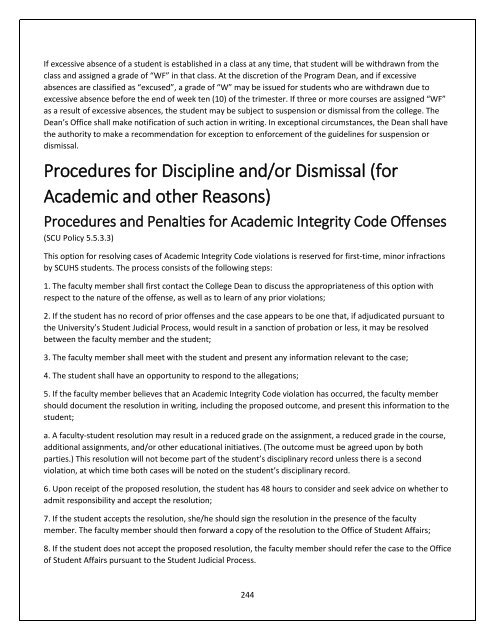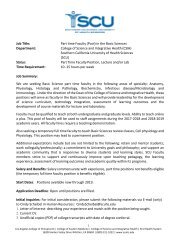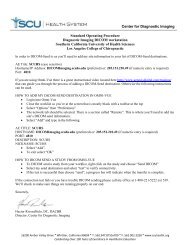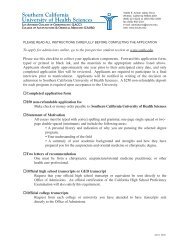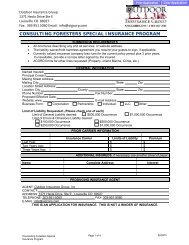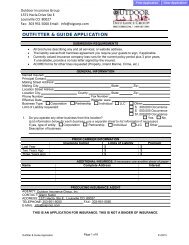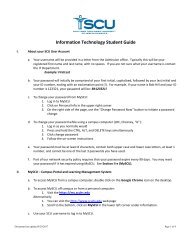Vision, Mission, and Guiding Principles for SCUHS
Southern California University of Health Sciences will be recognized as the premier evidence-based integrative healthcare university. in this PDF we are discussing about our Vision, Mission, and Guiding Principles. Please have a look. you can also go with this link: https://bit.ly/2JuIItL
Southern California University of Health Sciences will be recognized as the premier evidence-based integrative healthcare university. in this PDF we are discussing about our Vision, Mission, and Guiding Principles. Please have a look. you can also go with this link: https://bit.ly/2JuIItL
Create successful ePaper yourself
Turn your PDF publications into a flip-book with our unique Google optimized e-Paper software.
If excessive absence of a student is established in a class at any time, that student will be withdrawn from the<br />
class <strong>and</strong> assigned a grade of “WF” in that class. At the discretion of the Program Dean, <strong>and</strong> if excessive<br />
absences are classified as “excused”, a grade of “W” may be issued <strong>for</strong> students who are withdrawn due to<br />
excessive absence be<strong>for</strong>e the end of week ten (10) of the trimester. If three or more courses are assigned “WF”<br />
as a result of excessive absences, the student may be subject to suspension or dismissal from the college. The<br />
Dean’s Office shall make notification of such action in writing. In exceptional circumstances, the Dean shall have<br />
the authority to make a recommendation <strong>for</strong> exception to en<strong>for</strong>cement of the guidelines <strong>for</strong> suspension or<br />
dismissal.<br />
Procedures <strong>for</strong> Discipline <strong>and</strong>/or Dismissal (<strong>for</strong><br />
Academic <strong>and</strong> other Reasons)<br />
Procedures <strong>and</strong> Penalties <strong>for</strong> Academic Integrity Code Offenses<br />
(SCU Policy 5.5.3.3)<br />
This option <strong>for</strong> resolving cases of Academic Integrity Code violations is reserved <strong>for</strong> first-time, minor infractions<br />
by <strong>SCUHS</strong> students. The process consists of the following steps:<br />
1. The faculty member shall first contact the College Dean to discuss the appropriateness of this option with<br />
respect to the nature of the offense, as well as to learn of any prior violations;<br />
2. If the student has no record of prior offenses <strong>and</strong> the case appears to be one that, if adjudicated pursuant to<br />
the University’s Student Judicial Process, would result in a sanction of probation or less, it may be resolved<br />
between the faculty member <strong>and</strong> the student;<br />
3. The faculty member shall meet with the student <strong>and</strong> present any in<strong>for</strong>mation relevant to the case;<br />
4. The student shall have an opportunity to respond to the allegations;<br />
5. If the faculty member believes that an Academic Integrity Code violation has occurred, the faculty member<br />
should document the resolution in writing, including the proposed outcome, <strong>and</strong> present this in<strong>for</strong>mation to the<br />
student;<br />
a. A faculty-student resolution may result in a reduced grade on the assignment, a reduced grade in the course,<br />
additional assignments, <strong>and</strong>/or other educational initiatives. (The outcome must be agreed upon by both<br />
parties.) This resolution will not become part of the student’s disciplinary record unless there is a second<br />
violation, at which time both cases will be noted on the student’s disciplinary record.<br />
6. Upon receipt of the proposed resolution, the student has 48 hours to consider <strong>and</strong> seek advice on whether to<br />
admit responsibility <strong>and</strong> accept the resolution;<br />
7. If the student accepts the resolution, she/he should sign the resolution in the presence of the faculty<br />
member. The faculty member should then <strong>for</strong>ward a copy of the resolution to the Office of Student Affairs;<br />
8. If the student does not accept the proposed resolution, the faculty member should refer the case to the Office<br />
of Student Affairs pursuant to the Student Judicial Process.<br />
244


